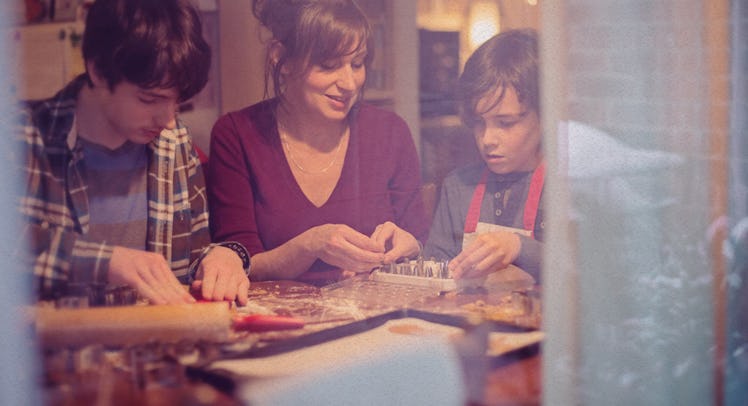It’s Sibling Parenting Style Comparison Season!
For distant families, the holidays are a great time to compare and contrast parenting styles

Comparisons make parenting fraught every damn day and doubly so on Thursdays and Saturdays, when my son has playdates with Ryder. I see how neatly his parents’ shoes are lined up in his hallway and how delightfully, delectably tantrum free the townhouse is. How, I wonder, have I fallen so short that my son screams like a banshee, cries like a river, shares like a miser, and sleeps like a 24-hour diner? I have to comfort myself with known unknowns. I don’t really understand how Ryder’s family works and it might (I hope) be nothing more than a facade, a Potemkin household. So what’s the point of comparing myself to these people? There is none so I can shrug off their apparent excellence.
Then comes Christmas and intrafamily comparison and there go the known unknowns. Because siblings represent as close to a perfect data set as possible.
My sister is two years older than I am. She’s 39 and lives in Northern California and has two kids, Shmuel and Moishe (not really, but they’re familiar with the Pentateuch).We dealt with our parents’ divorce differently. We grew apart afterwards and only reconnected in a meaningful way when we started families of our own. But the fact is we have the same mother, who I will call Mothra, and the same father, who I don’t call at all. So, as far as parental inputs go, we’re twins. Shmuel is a little bit older than my elder son and Moishe is a little bit younger than my youngest son.
Whereas I spin from indulgence to discipline like a mad driedel, my sister, Rivka, maintains a steady highly-demanding routine. Whereas I figure it’s better to let my sons go on and on, spinning ever weirder (and grosser) stories, my sister cuts Shmuel and Moishe off when they lose the plot. They take piano lessons. They take swim lessons. They fucking know how to ride their goddamn bikes. My kids, on the other hand, know only enough of the keyboard to press autoplay. Their bikes are currently rusting, going straight from the box to obsolescence and they’re still at the terrified doggy paddle stage of swimming.
I can tell you the intention behind our style of parenting. That society places too many demands, forces too hard, too quickly the development of what is natural in a child. That we, as parents, are often too eager to snuff out the hint of a passion with the full force gale of our expectations. But on the other hand, hot damn are my sister’s impressive. When she comes over, my boys look at Moishe and Shmuel like they’re ubermenschen. Moishe and Shmuel regard my children, conversely, as feral dodos.
Lately this lady named Julia has been helping me realize how much of my own issues have to do with my childhood. We sit in a small windowless room with too many pillows on the couch and I talk about my dad for 45 minutes and then she makes me pay her $200. When Rivka, Moishe and Shmuel come visit, it’s a chance to gut check those insights; to see, in some way, how much of my parenting style I can lay on my parents and how much I have to admit to myself is my own doing.
For instance, I always thought my style of shrill discipline was a product of my old man’s mouth-foaming rage. It’s a toned-down version, for sure, but vestigial. And that my laxity when it comes to pushing my own children was because I was pushed so hard. But seeing Rivka interact with her own accomplished kids in a matter-of-fact but stern tone made me own up to the reality that it was me, not the sour-breathed specter of my father, who was responsible. And that the consequences of pushing kids as hard as we were aren’t indeed catastrophic….yet!
More saliently, it wasn’t her actions that were so instructive but their results. Shmuel and Moishe sit for extended periods of time. Shmuel will spend hours with his legs crossed on a sofa, reading. Admittedly my oldest can’t read yet, nor can he sit. In the bubble of our own home, I had normalized to myself his tantrums (plural: tantra?) and mood swings. But having a cohort — same blood, mostly — against which to compare forced a reckoning that something was off, something needed to change. My sister’s whole family throws my whole family into sharp relief.
It will all, I’m sure, shake out in the end . What my kids lack in discipline, perhaps they’ll make up for in creativity. Perhaps they’ll never learn how to play Fur Elise, but, on the other hand, they also won’t need to pay a Julia $200 for 45 minutes to talk about how their dad forced them to take piano lessons. And I’m pretty sure that by the time they’re eight or so, they’ll be motivated enough by shame and basic human pride to learn how to ride a bike, swim in the ocean, tie a shoe, skip a rock, weld, whittle, bake cookies, broil salmon, surf and care for succulents. But, until then, every Christmas will be a well-controlled study in contrasts. The conclusion of which will be feelings of insecurity. Tears drowned in egg nog.
True, having such an apples-to-apples comparison is gutting, exactly because it isolates the variables and the variable is me, the culpability mine. But it’s not all bad news bears. Besides the benediction of familial love, what cheers me about the multivariate regression analysis that accompanies sibling studies in an academic setting and the holidays in my den is that I’m a variable. And if I am the variable, nothing is predetermined. I can be whatever kind of parent I want. After all, what do variables do but change?
This article was originally published on